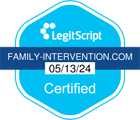Interventions for families and their loved ones affected by Mental Disorders, Alcohol, and Drug Addiction
We understand the impact of the addiction and mental health on the family.
Rock Bottom is not something you hit; it is something you feel.
Families are often told that not much can be done until the substance user wants help or hits rock bottom. We are here to help your family understand that you don’t have to wait for the substance user to do either of those things.

When your family has reached rock bottom, you don’t need permission to ask for help.
It is difficult if not impossible to see the situation from the stage. A clearer understanding most often comes from the view in the balcony. The intervention process helps families see from a different perspective.
Being emotionally attached and overwhelmed can compromise the ability to find successful solutions. An unbiased professional is able to see things much differently. Here are some effective approaches.
How Our Mental Health Disorder/Dual Diagnosis, Alcohol, and Drug Addiction Interventions Work
Step 1:
Initial
Consultation
The initial phone consultation seeks to identify what is keeping your loved one from wanting help, and it is intended to help the family overcome their fears and behaviors that may be holding them back from taking action.
Our goal is to listen to your story and see how our experience and expertise can help you identify why your family may be sacrificing their needs in exchange for ensuring that someone else’s are met.
Successful interventions often come about as a result of the family recognizing how they have put off living the life they want in exchange for enabling a substance user to stay in his or her addiction. Understanding why and how this happens is the first part of changing the family dynamic that is blocking the family’s and the substance user’s path to an otherwise better way of living. There is a way for both sides to take control of their own lives rather than surrender to the needs of the other.
Step 2:
Educate Family
About Addiction, Mental Health, and Dual Diagnosis
We understand that most people would prefer their loved ones to be safe, warm, and well-fed. That’s why many enable an addict or alcoholic, believing that if they didn’t help, then the loved one would not take care of him or herself, and things would get worse. A tenet of our intervention process is that when families assume responsibility for the needs of their loved ones, they disable them from addressing those needs as they otherwise would be instinctively capable of doing. It is not so much what the enabling is doing as it is seeing how families are disabling them from getting better so that both sides can survive in a life without codependency.
Most people enable the addict or the alcoholic to fulfill their own need of acceptance and purpose. We all want to be loved and approved, and when we give all of that to the substance user, we take it away from ourselves and others in the family who need it just as much. The very things people need in life to be happy are being exchanged for making sure one person is not mad at us. This most always fails, and the family implodes with resentments that give rise to the formation of unhealthy maladaptive family roles.
Step 3:
Getting The
Process Started
Interventions are supposed to be about changing perception through education in order to help the family see how much the current approaches are disabling both the substance user and the family. Many behaviors are codependent in nature and prevent both from moving forward.
Many interventionists do an outstanding job of encouraging the substance user to accept help. Unfortunately, that is all most do. They run through the basics of enabling; they instill you with fear of what will happen if you don’t stop enabling; and then they perform a 12-step call that allows your loved one to accept treatment. Sounds great! And then what? A family needs a reset and an overhaul with continued support and guidance as to what to do next and why. Most families seeking intervention have previously had their loved ones in treatment and often several times. We would like to help your family and your loved one have a better opportunity to make this the last time.
We help families take their lives back and assist both the family and the substance user in pursuing a path towards growth and happiness. Both sides have the ability to be doing something else in life, something that is far more fulfilling than what they have been doing up until now.
An intervention is not about how to control your loved one with a substance use or mental health disorder; it is about learning how to let go of believing you can.
“Many interventionists try to play therapist and clinician while adding on family recovery and coaching services. None of these interventionists is qualified or licensed to do that. Interventionists must stay in their lane after the person accepts help. The best outcomes come from your loved one’s treatment team and the treatment center’s family program. If you choose an interventionist who offers support services after a successful intervention, it will create friction and discrepancies in your loved one’s treatment; we have gone down that road, and it does not work.”
Mike Loverde, MHS, CIP





